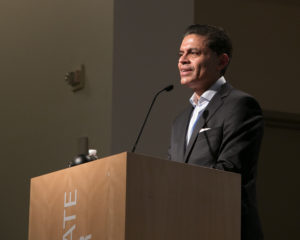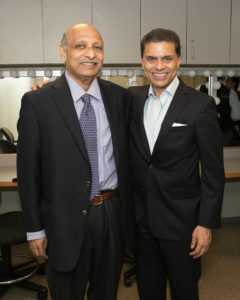What are the principal threats to democracy? To offer an answer to this question, The Graduate Center’s Democracy Project, as part of its ongoing event series, hosted journalist, TV-show host, political scientist and author Fareed Zakaria to speak before a packed house.
Graduate Center Professor Uday Singh Mehta (Political Science) introduced Zakaria and welcomed the many who had come to celebrate the 50th anniversary of Seva Mandir, India’s leading nonprofit organization advocating for sustainable development, empowerment, and the creation of strong, ethical communities.
In his address, Zakaria explored the concepts of democracy and justice in the international world order.
Zakaria’s talk was especially timely. The wave of democratization that started in the mid-1970s and crested with the fall of the Iron Curtain in 1989 is in regress, he holds. Thirty years on, a crisis of democracy plainly exists throughout the world, including in the established Western democracies.
But what is the nature of this crisis? To answer this question, Zakaria drew on two elements of democracy in the Western world: the popular element of voting and the liberal element that protects the rights of minorities. Both of these elements are in contradiction, as liberty requires protection from majoritarian inclinations, while voting aims to empower majority rule.
These contradictions have been inherent in liberal democracy from its inception. But are these contradictions coming to a head now? Zakaria referenced the four C’s of capitalism, culture, class, and communication.
The first C, capitalism, has changed in nature over the course of the postwar period. Today’s global capitalism, which is heavily skewed in favor of financial capital, leads to a highly unequal distribution of income and wealth. The backlash against liberal democracy is a reaction of the losers of this unequal distribution.
The second C, culture, is about the perception of once-privileged majorities that their way of life is coming under threat. These cultural shifts are not solely about immigration but, also, about the cultural influences of a globally dominant intellectual elite that makes itself felt across all aspects of life. This includes the increasing attractiveness of urban centers at the expense of rural areas as well as issues such as the greater emphasis on environmental protection over economic growth, marriage equality for same-sex couples, and gender equality. According to Zakaria, these cultural shifts lead to a feeling of “being left behind” in cultural terms. The reaction to this sense of loss is an attempt to “take back control” — not primarily national sovereignty, as the Brexit vote would suggest, but rather cultural hegemony.
With the third C, class, Zakaria turned to a concept that is not much talked about in the U.S. Class divisions transcend economic divisions, and there are large groups, particularly in rural areas, that lack the opportunities of the urban elites and are being left behind. These divisions are politically most salient with regard to the lifestyles, preferences, and cultural practices that define a class. Trump voters don’t hate rich people, Zakaria said. What they dislike is urban professionals who practice yoga and eat kale. This class division, Zakaria argued, produces a tribal mentality that is at the heart of party polarization in the U.S., which is proving increasingly difficult to overcome.
With the fourth C, communication, Zakaria referenced the new media environment that defines the way people access information. Social media and tailor-made news streams create filter bubbles that reinforce preconceived notions of identity and “otherness.”
All of this adds up to a divisiveness that is eroding democratic norms and institutions in Western democracies — the culture of democracy and not just its components. According to Zakaria, the jury is out as to how much damage has been done. In the U.S., some institutions, such as the judiciary, have fought back, at times robustly. Zakaria’s overall assessment: Even though Western democracies are fragile, there is resilience and cause for hope.


